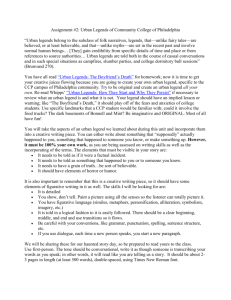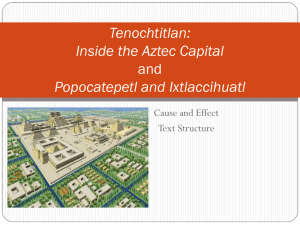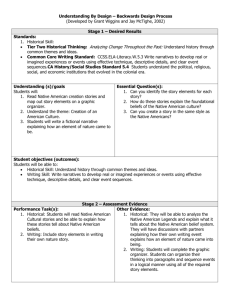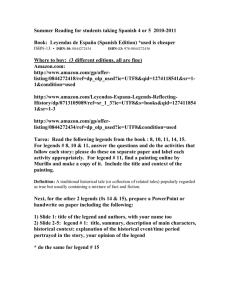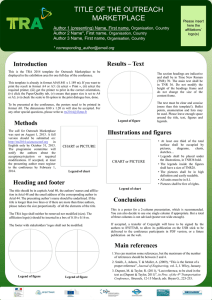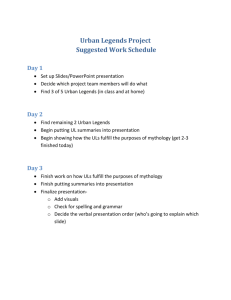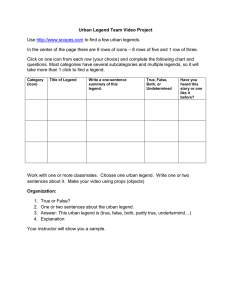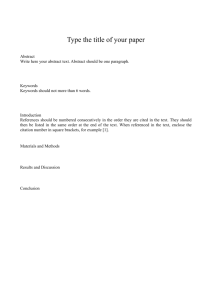WebQuest Template - GATE WebQuest Middle/High
advertisement
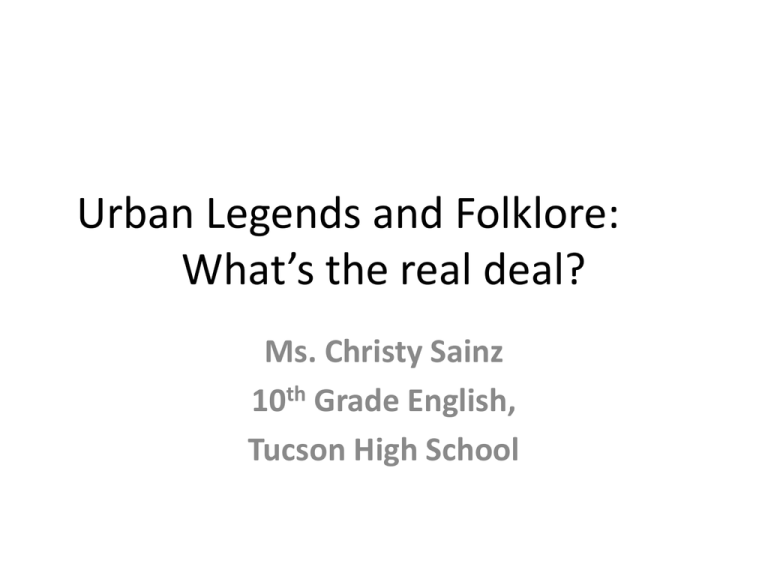
Urban Legends and Folklore: What’s the real deal? Ms. Christy Sainz 10th Grade English, Tucson High School Introduction • • • • • This WebQuest is to be conducted in a high school English class, designed for grade-level 9-10 students. The subject of inquiry is based on a specific literary genre, Urban Legends and Folklore. Urban Legends are modernized tales, largely of unknown origin, that usually contain a moral teaching or practical lesson, lessons upheld with little or no supporting evidence. These legends are often either humorous or horrifying, or a combination of the two. Students will conduct research on the history of these legends, compare differences and similarities among several stories, consider the differences and similarities in several versions of the same story, and come to their own conclusions about the general patterns and conventions of this literary form. Students will consider the validity of these legends, whether or not they deserve to be considered true, as well as the reasons behind their recursive presence in the realm of storytelling. Additionally, the students will employ their knowledge afforded by the research to adopt a pattern on which to base their own urban legend, of original authorship and creation. Introduction "So, my friend's sister's friend, two towns over, found out what REALLY happens when you turn the lights off in the restroom and repeat a certain person’s name three times…….now she’s SCARED TO BE ALONE!! "My friend's father's cousin's uncle went to Mexico on vacation and bought a chihuahua. He discovered after he bought it that they're actually not dogs, but rodents bred to look like dogs...." Have you ever heard a story like this before? Chances are, you have. These stories, characterized by bizarre reports and secondhand accounts of paranormal incidents which toe the line between fact and fiction, are widely known as "urban legends" or "urban myths". Urban legends are modernized stories, generally of unknown origin, and are characteristically told for a few select reasons. For cautionary purposes, to warn by way of aphoristic teaching; and for the benign purpose of entertainment by way of horrifying situations. In this WebQuest, you will look for the reasons these stories are so often told, why they are interesting or disturbing, and how much truth to them there is. Task • • • • • • The task you're taking on will be a combination of philosophical quest, blended with literary research/analysis of the zany and entertaining, and the opportunity to create your own interpretation of an urban legend. You will work to complete this task in groups of three. Each group member will have a specific role and be responsible for the work associated with that role, however, the task is a collaborative effort and you should strive to reach consensus in decisions regarding its conception. You will select 2-3 urban legends to read and consider some questions about the patterns and conventions you notice as you read them, then you will select a myth to "recreate", using the general plot-line as a guide to make the story into your own. The story you've modified may either be a presentation/re-telling of the story, or in the form of a comic strip. Within your groups, three different roles will be assigned. There will be a: Story Sociologist: This person's job is to consider the "human interest" and psychological aspects of urban legends, how they evolve and why they endure. Myth-Buster: This person will look at each legend with a critical, analytic eye. You will probe beak-deep into the logical side of each legend, considering whether they are fact or fiction. Legend Specialist: This person will be responsible for overseeing the groups' reinterpretation of an urban legend. He/she will probably have creative tendencies and enjoy revamping the story, should be the creative administrator and welcome suggestions from the other group members. Process • • • • • • • Process 1 Even if you've never heard the term "urban legend", chances are, you've probably had one told to you or maybe even retold one yourself. We are generally exposed to urban legends by "word-of-mouth", but they can show up in other places, too. These are stories that you might not find in a textbook or literary anthology, but they play a fascinating role in the subject of storytelling. Step 1: Investigating Urban Legends Essential Question: What are some general characteristics of urban legends? What purpose(s) does telling, and re-telling, them serve? As a starting point, check out the following websites: How Urban Legends Work How They Start and Why They Persist Spiders in the Hairdo, Book Preview Step 2: Identifying Types of Urban Legends Essential Question: Why is it important to evaluate credibility? What problems could arise in believing everything we read or hear? Urban legends are usually told to entertain, to warn, or to scare. While many of the events in these stories are not true, their ubiquitous presence makes them hard to ignore. Likewise, the Internet is hard to ignore. It has also become a huge source of urban legend spreading. In some ways, the Internet is a good analogy of urban legend themselves; there are "grains of truth" out there, but we must be careful not jump to conclusions. Many websites (regarding urban legends or otherwise) are not credible, much like rumors and legends themselves. • Use this guide Is This A Hoax? to evaluate the previous websites you've visited, in addition this well-known Urban Legend Expert site: Snopes • How is the advice on his website similar to distinguishing between fact and fiction, in terms of urban myths? Click Here • • Step 3: The Sociological Aspect of the Urban Legend Essential Question: Why do these stories endure? What similarities do urban myths share with other forms of mythology, fables and fairy tales; and what sets them apart? If most of them are untrue (rumors, misinformation), then what can we learn from them? And what can they tell us about our society? In your groups, you will engage in a Jigsaw activity. Each of you will read one article out of the three listed below. You will be the "expert" in terms of the content of the article you chose, your job is to inform your other group members of its content. Brief your group members on what urban legend each article's topic is based on (for example, synthesize the "hook man story"), but also make an attempt to understand the broader implications each author poses. These are dense articles, but don't panic, we aren't looking for a "right" answer. Alligator in the Sewer Hook Man Speaks Ghosts in Mirrors Some leading questions to consider as you read: What is the role of "fear" in each of the articles? How important is its relationship in each legend and what does the author suggest of its importance? Even if the legends are false, why could they be considered true? • • • • • • • • • • • • • • • • • Process 2: Essential Question: Is the truth "out there"? How does our environment influence us in what we perceive to be true? At this point, you've done a lot of sleuthing in terms of legends and myths, AND a bit of website sleuthing (bet you didn't see that coming!). How credible were the websites you rated? Why would I send you to somewhat questionably accurate websites? How in the world is this related to urban legends? Discuss these questions in your groups, and brainstorm a list of factors that influence people's trust in a legend or myth. Brainstorming Guide This will be useful in choosing which urban legend to make your own (you want your story to be as believable as possible!) Process 3: At this point, your group is ready to get started on your project. You've chosen a legend to revise as your own and update accordingly. Things to Consider: -How will you make your myth seem convincing/seem plausible? -Provide a distinct location for the events that take place in the myth -Update details according to time period in which it takes place Whether you choose to do a presentation, scrapbook, or some other visual form (options include PowerPoint, poster), each group member must address a specific question related to their role: Story Sociologist: What conclusions did your group come to as to why this particular story interests people--what makes it relevant to us? Myth-Buster: Why is hard to know whether a legend is true or false? Legend Specialist: How is it possible that multiple versions of the same story can be told all over the world; how did your group make your own version? Process Falls Far Below Approaches Meets Exceeds 1. Has clear vision of final product 1, 2, 3 4, 5, 6 7, 8, 9 10 2. Properly organized to complete project 1, 2, 3 4, 5, 6 7, 8, 9 10 3. Managed time wisely 1, 2, 3 4, 5, 6 7, 8, 9 10 4. Acquired needed knowledge base 1, 2, 3 4, 5, 6 7, 8, 9 10 5. Communicated efforts with teacher 1, 2, 3 4, 5, 6 7, 8, 9 10 Product (Project) Falls Far Below Approaches Meets Exceeds 1. Format 1, 2, 3 4, 5, 6 7, 8, 9 10 2. Mechanics of speaking/writing 1, 2, 3 4, 5, 6 7, 8, 9 10 3. Organization and structure 1, 2, 3 4, 5, 6 7, 8, 9 10 4. Creativity 1, 2, 3 4, 5, 6 7, 8, 9 10 5. Demonstrates knowledge 1, 2, 3 4, 5, 6 7, 8, 9 10 Conclusion • • • Great job on all you've accomplished! I truly hope this experience has been worthwhile and meaningful to you, along with causing you to think in BIGGER ways (or in terms of trusting the latest rumored-to-be fact, at least think twice). If you are interested in further information on urban legends, visit your public library, or research databases such as WorldCat, or take note of any bizarre reports you happen to overhear. Click here to give feedback to the author Credits • • • • Thanks QuestGarden and Dr. Clemens. Author Biography Permissions We all benefit by being generous with our work. Permission is granted for others to use and modify this WebQuest for educational, non-commercial purposes as long as the original authorship is credited. The modified WebQuest may be shared only under the same conditions. See the Creative Commons Attribution • Non-Commercial• Share-Alike license for details. This WebQuest was created in QuestGarden Teacher Page This WebQuest has been designed to teach students about urban legends, but also an introduction to practice modern research techniques and identifying credible websites. Any and all websites have been continuously mentioned in this WebQuest. • Standard Statements • • • • • • • • • • • The student writer/reader will: 9-10.W.7 Conduct short as well as more sustained research projects to answer a question (including a self-generated question) or solve a problem; narrow or broaden the inquiry when appropriate; synthesize multiple sources on the subject, demonstrating understanding of the subject under investigation. 9-10.W.8 Gather relevant information from multiple authoritative print and digital sources, using advanced searches effectively; assess the usefulness of each source in answering the research question; integrate information into the text selectively to maintain the flow of ideas, avoiding plagiarism and following a standard format for citation. 9-10.W.9 Draw evidence from literary or informational texts to support analysis, reflection, and research. – Apply grades 9-10 Reading standards to literature (e.g., “Analyze how an author draws on and transforms source material in a specific work [e.g., how Shakespeare treats a theme or topic from Ovid or the Bible or how a later author draws on a play by Shakespeare]”). Apply grades 9-10 Reading standards to literary nonfiction (e.g., “Delineate and evaluate the argument and specific claims in a text, assessing whether the reasoning is valid and the evidence is relevant and sufficient; identify false statements and fallacious reasoning”). 9-10.SL.2 Integrate multiple sources of information presented in diverse media or formats (e.g., visually, quantitatively, orally) evaluating the credibility and accuracy of each source. 9-10.SL.3 Evaluate a speaker’s point of view, reasoning, and use of evidence and rhetoric, identifying any fallacious reasoning or exaggerated or distorted evidence. 9-10.RL.9 Analyze how an author draws on and transforms source material in a specific work (e.g., how Shakespeare treats a theme or topic from Ovid or the Bible or how a later author draws on a play by Shakespeare). References • by Sarah LaPrade, James Madison University • This WebQuest was created in QuestGarden • In addition to this WebQuest, the teacher may want to seek out credible instructional videos, textbooks, "encyclopedias" of urban legends.
